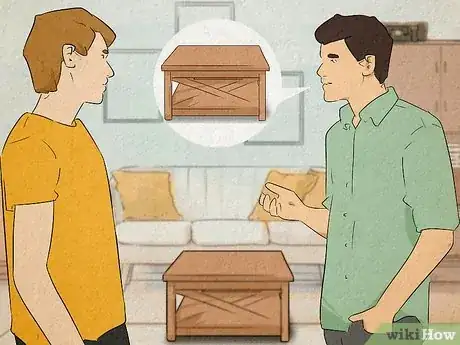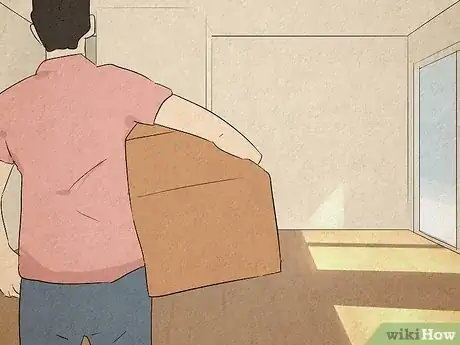This article was co-authored by Michael Dickerson, PsyD and by wikiHow staff writer, Madeleine Criglow. Michael Dickerson is a Clinical Psychologist with over 6 years of experience working in college counseling. He specializes in anxiety, OCD, and men's mental health. Michael holds a BA in Psychology from California State University, Sacramento and a Doctor of Psychology (PsyD) from The Wright Institute in Berkeley CA.
This article has been viewed 19,655 times.
So you're planning on moving, but you haven't broken the news to your roommate yet. Telling your roommate you're moving out can almost feel like a breakup, but it doesn't have to be the end of your friendship if you don't want it to be. If you're nervous about this potentially awkward conversation, this article is here to help. We've got the best tips on how to handle this conversation so that you can address your move without hurting your roommate's feelings. That way, you can find a better living situation while remaining on good terms with your (soon-to-be-former) roommate.
Steps
Identify why you want to move out.
-
Determining your reasons can help you prepare what to say. From personality clashes to lifestyle differences, it's super common to want to leave a less than desirable roommate situation. Identifying why exactly you want to move out can help you feel more confident in your decision, and it'll even help you feel more prepared when you bring up your plans to your roommate.[1] X Research source Here are some common reasons people end up seeking out new living situations:
- Cleanliness issues (i.e. one roommate is super clean and the other is messier)
- Lifestyle differences (i.e. one roommate likes having friends over and the other likes keeping a quiet apartment)
- Personality differences (i.e. both roommates find it difficult to get along with each other)
- Wanting to live with a partner
- Financial costs (i.e. no longer being able to afford the rent)
- Relocating to a new city
Plan out your words in advance.
-
Planning will help you feel more confident during the conversation. If you're nervous to tell your roommate, try brainstorming how you would like to deliver the news. This can help you find the right words to say so that you share your plans as respectfully as possible. Plus, you'll have some extra confidence going into the conversation if you already know what you're going to say.
- Try writing out what you'd like to say to determine the right words.
- Call up a trusted friend or family member to figure out what you want to say and practice your delivery.
Bring up the conversation in person and in private.
-
Telling your roommate in private helps avoid putting them on the spot. Plus, it will allow you some privacy if the conversation gets emotional. To ensure the conversation goes as well as possible, pick a time when the two of you are both free of distractions. You might try when the two of you are eating dinner together at home or spending time in the living room.[2] X Research source
- Avoid letting your roommate know you're moving with a text. Your roommate will likely take the news much better if you let them know through a mature and direct conversation.
Let them know with at least 30 days' notice.
-
Giving notice will help your roommate find a new roomie in time. Though you might be tempted to put off this conversation, it's best to let your roommate know as soon as possible. That way, they'll have enough time to find a new roommate or look for a new place to live. In most locations, 30 days' notice or more will be enough time.[3] X Research source
- Make sure to give your landlord notice that you plan on moving. Read over your copy of the lease agreement to double-check how much notice they require, then provide your notice in written form (a letter or an e-mail will usually work).
- You might consider giving your roommate more advance notice if you live in a competitive housing market or a bigger city (60-90 days' notice will be plenty of time).
Explain why you're moving out.
-
Help your roommate understand your perspective. The news may be a shock to your roommate. Giving them a thoughtful reason can soften the blow and help them see your point of view. Just make sure you word your reasons carefully. Rather than going on a rant about all their flaws, emphasize your feelings and experience to avoid making your roommate feel defensive.[4] X Research source
- "I've really enjoyed living together, but I've decided that I'd like to move to a new place when the lease is up. This apartment is a little out of my price range, and I need to find a less expensive living arrangement."
- "As much as I've loved living with you, I think I need a quieter environment. I've decided to move to a new place this summer. I hope you understand."
- "You've been an incredible roommate, but my partner and I have decided to move in together. I'll be moving in 3 months when the lease is up."
Keep the conversation polite and respectful.
-
Even if things get emotional, do your best to be kind and calm. Your roommate might be surprised or hurt. Try to listen to what they have to say and understand their perspective while remaining firm in your decision. If you show your roommate that you're still there to support them, they may take things less personally.
- Offer words of support like, "I totally understand that this may be a surprise" or "I get why you would be upset. I might be moving, but I'm still here for you."
- Use I-statements to avoid making your roommate defensive. Instead of saying "I'm leaving because you never help clean the apartment," you might say, "I'd like to move because I do better in a cleaner environment."[5] X Research source
- If they're really upset, consider giving them some alone time to cool off. You might excuse yourself by saying something like, "I'm going to be out for the afternoon, but I'm happy to talk about this again tomorrow."
Offer to help them find a new roommate.
-
Show your roommate that you care with this kind gesture. If you're worried about how your roommate is going to take the news, offering to help can go a long way. Let them know that you would be happy to look for a new roommate to take your place. Even if you don't find someone, your roommate will appreciate the help. You might try:
- Making a social media post to announce the open room
- Asking your friends and family if they know anyone looking for a room
- Helping your roommate post an ad on Craigslist.org or Roommates.com
Make plans to keep hanging out if you’re friends.
-
Show your roommate you don't want to end your friendship. If you and your roommate are buds, let them know that you still want to hang out when you're no longer roommates. When your roommate first hears the news, they might be worried that your move will change your friendship. Making your intentions clear and letting them know you still want to spend time together will ease their anxiety.[6] X Research source
- "I'm going to miss you so much. After I move, we should make plans to get lunch once a week."
- "I don't want this to affect our friendship. You've gotta visit and explore my new neighborhood with me!"
- "I know I'll be out of state, but I still want to catch up all the time. We'll have to schedule regular video calls."
Bring all of your stuff with you when you move.
-
Try your best not to leave anything for your roomie to clean up. If you've got an old chair or some books you don't want to take with you, avoid the temptation to leave them behind. Instead, sell them before you head out or donate them. That way, your old roommate won't be left with any work to do after you go.
- It's okay to ask if your roommate would like to keep anything of yours. Just make sure to take everything they don't want.
Address any shared belongings.
-
Decide who is going to keep what if you bought things together. As your move-out day approaches, talk to your roomie about all the things you bought together for your home. There might be items that your roommate would like to keep, like a shared bookshelf or microwave. Finding a compromise and even offering to leave behind shared items can help you and your roommate remain on good terms.
- If the two of you bought a coffee table together, for example, consider leaving it and buying one for your new place. A kind gesture like this can act as an olive branch to help you and your roommate stay friends.
Clean up your room and shared living spaces.
-
Cleaning up will help your roommate prepare for a new roomie. Even if you're tempted to take your things and go, make sure to clean up after yourself first. Do a deep clean of your room and tidy up the shared living spaces in your home like the kitchen, bathroom, and living room. It will help your roommate get the place ready for a new person to move in, and it's a considerate and kind gesture.
- Throw away any remaining garbage in your room, vacuum the floors, and dust to make it sparkling clean for the new roommate.
- Vacuum, dust, and tidy up your living room, kitchen, and bathroom before you go to give your old roommate some extra help.
Expert Q&A
-
QuestionHow can I make moving out less stressful?
 Michael Dickerson, PsyDMichael Dickerson is a Clinical Psychologist with over 6 years of experience working in college counseling. He specializes in anxiety, OCD, and men's mental health. Michael holds a BA in Psychology from California State University, Sacramento and a Doctor of Psychology (PsyD) from The Wright Institute in Berkeley CA.
Michael Dickerson, PsyDMichael Dickerson is a Clinical Psychologist with over 6 years of experience working in college counseling. He specializes in anxiety, OCD, and men's mental health. Michael holds a BA in Psychology from California State University, Sacramento and a Doctor of Psychology (PsyD) from The Wright Institute in Berkeley CA.
Licensed Clinical Psychologist Try breaking it up into smaller, more manageable steps. Getting started on a small step will help you keep up your motivation.
Try breaking it up into smaller, more manageable steps. Getting started on a small step will help you keep up your motivation.
References
- ↑ https://www.realestate.com.au/advice/5-ways-to-break-up-with-housemate/
- ↑ https://www.psychologytoday.com/us/blog/the-friendship-doctor/201011/when-youve-co-signed-lease-the-roommate-hell
- ↑ https://www.latimes.com/archives/la-xpm-2000-may-28-re-34896-story.html
- ↑ https://www.realestate.com.au/advice/5-ways-to-break-up-with-housemate/
- ↑ https://hellogiggles.com/lifestyle/break-up-with-your-roommate/
- ↑ https://hellogiggles.com/lifestyle/break-up-with-your-roommate/
- ↑ Michael Dickerson, PsyD. Licensed Clinical Psychologist. Expert Interview. 3 August 2021.
About This Article




















































